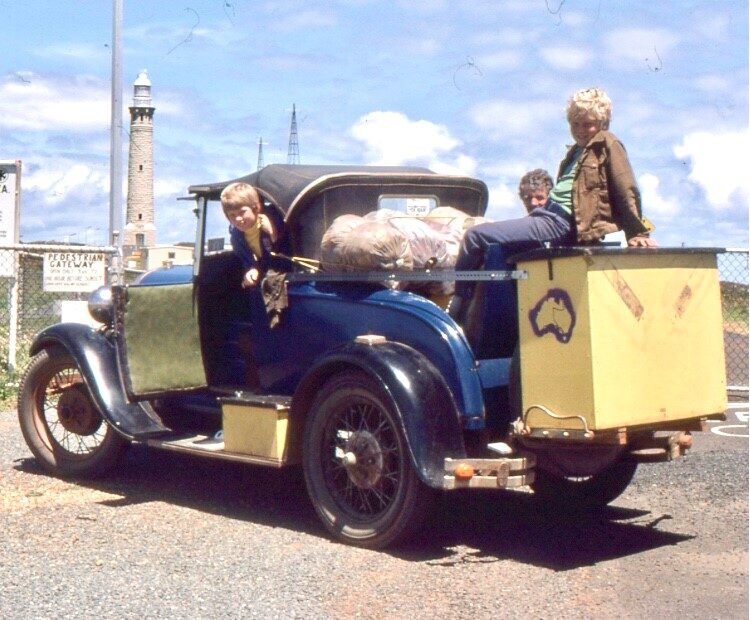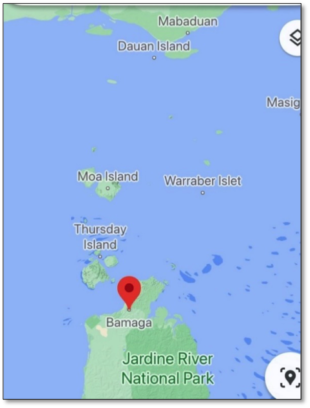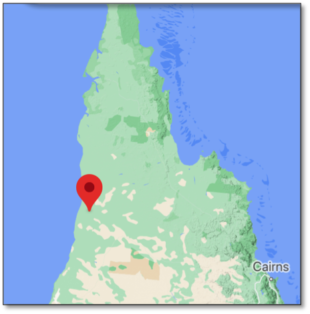ABM Archive Website
THIS WEBSITE CONTAINS ARCHIVE MATERIALS FOR HISTORICAL REFERENCE ONLY
For up-to-date information, including our latest appeals, news, and resources, please visit our current website.
Eulogy for John Buick Kaines

In Appreciation of John Buick Kaines, ABM Missionary Builder
Ivan Head
ABM has received news that John Kaines, former ABM missionary on Cape York and in the Torres Strait Islands, died recently in Adelaide at the age of eighty-eight. We extend our condolences to John’s wife, Gill, and to family members.
The Frank Coaldrake Medal was awarded to both John and Gill, in September 2018 in acknowledgement of their service and witness. ABM acknowledges their generous and lifelong support for our ongoing work.
With permission, ABM has produced below the eulogy written by their son, Neil Kaines, for the funeral service, as part of remembering and honouring service given in the mission that is Christ’s. There is much in it that the reader interested in mission today will find deeply valuable.
I have added two small maps to give the reader a sense of place and a sense of the vastness and diversity that is the Australian experience. Bamaga and Kowanyama appear in the eulogy and I encourage the reader to make a small web search on each locality.
Eulogy for John Kaines by Neil Kaines
|
Bamaga on northern tip of Cape York Peninsula |
John Buick Kaines, or “Dad” as we’ll call him from here, was born in December 1932 to his parents Margorie and Arthur Kaines, after his older sister Peg. They lived in the leafy suburbs of Melbourne and Dad and Peg went to some great schools in their neighbourhood. By Year 10 Dad knew school did not suit him well and he did not go on to year 11 but decided to try his hand at farming.
He left school and worked dairy farms in rural Victoria and sheep stations in central NSW, where he proved to have a strong survival streak by, as he put it, always getting along very well with the cook in those places. Dad was a humble person and always willing to admit when he wasn’t suited to a challenge he had undertaken. He quite liked the farming and livestock lifestyle but realised good farmers must have strong visual memories. Dad admitted he didn’t have this strength and could not excel at farming because of it, so decided this was not his calling in life.
Dad was a real adventurer and decided to ride a motorbike with sidecar north to explore. He described the road north as a dirt track following each side of the railway line, so he rode north on one side and back south along the other, describing the route as sparsely populated and remote in many areas. While quite an adventure in itself, I think the north Queensland country was appealing to Dad – very remote and with a real sense of frontier, and it must have left a lasting impression because of the path his life would take.
Dad had a strong Christian faith from an early age which completely shaped his life, as he placed great trust in God to provide for him and to provide answers to the big questions and decisions in life. For a young man from the inner suburbs of Melbourne he made some amazing decisions that few people would make unless motivated by such a faith. In return, God faithfully had big plans for him and I think they really must have caused his parents a lot of worry at times. Once Dad realised farming was not for him he returned to Melbourne, greatly concerned about what it was he was supposed to be doing with his life. He sent out feelers and within a week the Anglican Board of Mission responded and asked him to join the mission work in far north Queensland as cattle master for a massive cattle run on Cape York. Modest as ever, Dad said he was not entirely suited to the role as he wasn’t all that great at riding a horse or finding his way in the bush but the Aboriginal stockmen were very good at those, and Dad brought organisational skills which were essential to the operation. Soon after arriving, Dad was on a muster when he realised he had left his knife at the last camp, and being a good knife, he went back to get it. Having collected it he was uncertain how to rejoin the others and ended up lost in the bush. He also lost his horse while dismounted. The Great Dividing Range runs up past Lockhart and he was lost on the inland side of the range, which meant his attempts to follow the creeks to the coast where people were was actually leading him deeper into the bush. For almost a week he wandered and only survived because there was rain to provide him with water. Eventually he was exhausted for lack of food and settled on the side of a hill with all hope gone and too exhausted to move on, and he prayed for help. Within a short time, the mission supervisor and some Aboriginal trackers who had refused to give up the search were making their way along the valley below him and he was able to get their attention by calling out.
Dad worked in the missions doing whatever was needed in addition to cattle master and talked of driving supply trucks throughout Cape York. He developed a great relationship with the Aboriginal people in the mission towns. I once visited Lockhart, which is closed to visitors unless permission is given, and on mentioning John Kaines as my father, was permitted to camp on the old Lockhart town site and see a place he had lived and worked. In spite of this, he was not comfortable in his work and wondered what God’s plan was for him. Another concern was loneliness and he put that concern to God. Meanwhile, Margaret Gillian Watson whom you all know as Gill and I’ll call Mom from now on, was completing nursing training in London, and the Australian government was incentivising people like her to migrate to Australia. Mum became what we now affectionately call a Ten Pound Pom, with her subsidised fare of ten pounds to come and work in Australia. She and two friends bought a VW beetle and set off around Australia on an epic journey that really points to the same spirit of adventure that would soon bring Mum and Dad together.
Mum was working in Cairns Base Hospital and did a fly-in-fly-out day clinic in Mitchell River, and volunteered to stay behind for one night when an emergency evacuation meant the plane was full. The rain came in and Mum was stuck in Mitchell River for six weeks, during which time she met Dad and he invited her on their first date to go horse riding. Dad proposed to Mum on St Paul’s Island and they were married in Melbourne in November 1963, not very long after they first met. Two years later Fiona was born, two years after that I was born, and Bruce came along two years later again.
In 1964 Cyclone Dora hit Edward River and Mitchell River and destroyed the towns, with only a few buildings left standing. The destruction was so complete, with a £300,000 damages bill, that the government had to step in and take over from the diocese with a rebuilding program. That is when Dad discovered his true calling. He could visualise a building from the ground up, know what materials he needed, could put the building together and felt completely in his element doing it. He worked for the government for a while rebuilding the towns. He then become the diocesan builder, which opened up his scope across all of Torres Straight as well as the mainland. He went on to renovate most of the diocesan-owned buildings in Bamaga and Torres Strait, and was also the architect and builder for a number of churches in the Bamaga area.
After the service we’ll have a reception in the hall, and you’ll see lots of photos, and quite often an old A Model Ford features. When Fiona was born Mum and Dad had to get from Cairns back to Kowanyama, but they were unable to afford a 4wd, and wisdom at the time was that the high clearance and low gearing of the Model A was a good substitute. Dad found one being used as a farm vehicle already 30 years old and, with a little work, off they went across Cape York in it. Ever since then Chug has been a constant presence in the family as our daily driver in Bamaga on Thursday Island, and as conduit for many grand adventures. The biggest of all was a drive from Cape York to Cape Leeuwin with the family jammed into that little car and camping across Australia, which is a longer story in itself. As always, prayer and providence played a big part, with that journey’s start dependent on being able to cross the Jardine River just south of Bamaga. Days before it was time to leave, the river was too high to cross, but for the first time in history the council trucked in a car ferry to get vehicles across for a modest fee. Dad loved to tell of the many people we met along the way who helped when we needed it, or the timing of major mechanical failures like the radiator lasting through the desert to Alice Springs, or the differential failing just after meeting the Adelaide Model-A club president who rebuilt it for free when Dad needed the car in order to work. I remember the unshakeable confidence and competence he had when the car was threatening to lose a wheel somewhere between Bamaga and Weipa, and Dad decided we should have tinned peaches for tea so he could use the tin to re-shim the wheel. Also, the sense of humour he brought to hardship as we yelled at him to drive faster so the boiling water spraying out of the radiator would not land on our heads in the dicky seat. While building St George’s Church in Bamaga, Dad decided to use the cavernous interior as a boat building shed out of the heat and wet of the tropical north. I know Mum had mixed feelings about his dedication to the project as he worked on the church all day and then the boat many evenings.
|
The Red dot shows the location of Kawanyama on the western side of Cape York Peninsula |
It was necessary to extract the boat prior to the consecration of the church so the timeline was tight. But that sailing boat was the source of many fond memories and family adventures all over Torres Strait. I have clear memories of Mum and Dad pushing to get us off a beach on Saibai then a gust of wind filling the sail leaving three young children on the boat yelling for their parents on the beach to run and swim faster to catch up.
A diocesan builder’s family gets to live in an interesting array of places, and we spent some years moving from island to island as the work demanded. One downside is most islands don’t have places to spare so we often found ourselves living in Dad’s work. I can remember returning home one day to find that Bruce’s and my bedroom no longer had any floorboards and on another occasion you could not reach the entrance because the front steps were gone as he gradually rebuilt the white ant eaten parts of the house. On York Island we lived in the church hall with blankets hung as walls, and a 44-gallon drum under the gutter was our water supply. On Darnley we had to pump the water from the low tank to the high tank so the taps would work, and the washing machine had a cantankerous petrol motor and wicked looking wringer attached to it. Relaxing in the evening involved Mum or Dad constantly rising to pump the kerosene lanterns so they would be bright enough to read by and the trip to the outdoor dunny was horrifically scary after dark. The kero fridge was great for making an ice-cube tray of ice cream which never quite froze but ice cream was one of Dad’s favourite foods and a love shared by the whole family. On St Paul’s it was a treat to light the kero heated shower with a mad rush to get the whole family through in the few minutes it would stay lit and usually getting scalded by it. While not an unusual way to live in remote locations at that time I’m not sure how Mum and Dad were so cheerful when they would finally get a place habitable and freshly painted only to move on to the next build or renovation. Remarkably, Mum was able to work as a health team nurse regardless of where we moved in those parts, and we were able to make two yearly visits to all our family at the opposite end of the country which maintained our connections.
Dad was always looking to develop the interests of his children and to provide us with opportunities to develop skills. So, while boarding school was a necessary part of life, we would often come home for the Christmas holidays to find a newly built plaything. One year it was a canoe, another a row-boat, another a training sail-boat and another a motorbike. He would encourage us to take the family power boat to go camping and fishing and was always open to new forms of entertainment and adventure. To be honest, I’m not sure how we all survived but we can put that down to the power of prayer.
Dad’s big ministry calling was prayer. He dedicated a lot of time to praying and that was a gift he felt he had to exercise. There came a time where prayer was keeping him up late and he was growing tired, but was sure he was meant to keep going. He told of a time where he asked God to give him the refreshment he needed in the shorter sleeps he was getting and God replied saying, “Of course I will. I have just been waiting for you to ask”. This kind of experience was not rare for Dad. He also found membership of The Third Order of the Society of St Francis to be an important source of encouragement and guidance in his mission work and Christian life.
When the time came for Mum and Dad to leave the Torres Strait, they had kids distributed all over Queensland and family in Melbourne. They knew they must retire “down south” for a gentler climate and had really enjoyed one year in Adelaide while Mum was studying. It wasn’t the logical place to choose but Dad prayed and was told they would be happy in Adelaide. Finding a house they could afford was a minor miracle, and the last 30-something years in Adelaide have been truly happy for them. From here they travelled the world and travelled the country, visiting friends and family and always finding new adventures they wanted to take. They became deeply involved in this, their local church, where they have loved the community and been greatly blessed by knowing so many of you. As they have grown older the love of life and fun has remained despite adventures being limited to enjoying a good meal out, coffee at their local favourites, and visits from family and friends. Mum, Fiona, Bruce and I want to thank you all very much for your part in Dad’s full and rich life. He has indeed run with perseverance the race marked out for him and kept the faith.




